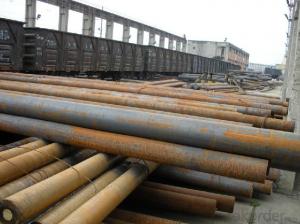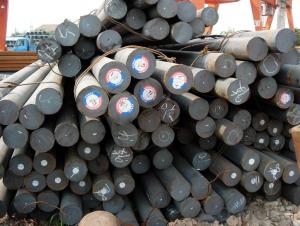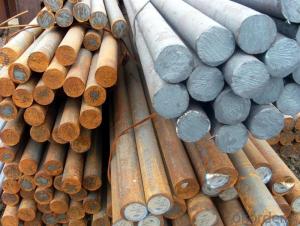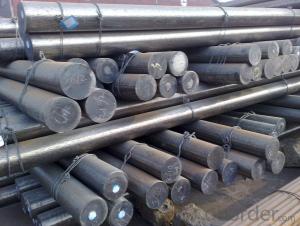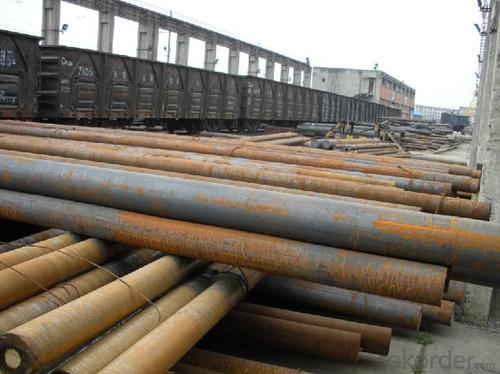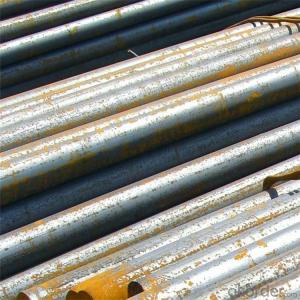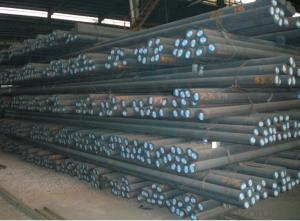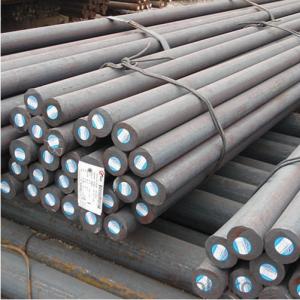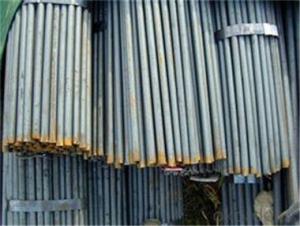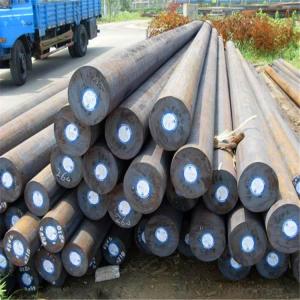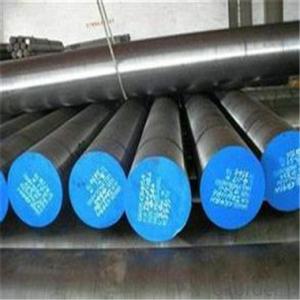S45C Forged Steel Round Bar for Building Material
- Loading Port:
- Tianjin
- Payment Terms:
- TT OR LC
- Min Order Qty:
- 25 m.t.
- Supply Capability:
- 50000 m.t./month
OKorder Service Pledge
OKorder Financial Service
You Might Also Like
Specification
S45C Forged Steel Round Bar for Building Material
Product Description:
1. Sizes: Diameter: 16mm-300mm; Length: 6m, 9m, 12m
2. Grade: S45C
3. Invoicing on theoretical weight or actual weight as customer’s request
4. Shape: Round bar, solid bar of steel with circular section
5. Technique: Hot rolled, forged, cold rolled
Chemical Composition:
C | Si | Mn | P | S | Ni | Cr | Cu |
0.42-0.50 | 0.17-0.37 | 0.50-0.80 | ≤0.035 | ≤0.035 | ≤0.30 | ≤0.25 | ≤0.25 |
Packing and Delivery:
Packing in bundle with steel strips and shipped by break bulk vessel or container (depend on target market and different ports)
Delivery Detail: Approx.45 days
Usage and Applications:
1. S45C Steel round bar is used in a large number of architectural and engineering structures. Or it can be used in construction of plants for the production of steel house frames, high-voltage transmission towers, bridges, vehicles, boilers, containers, ships, etc.
2. And we can use this kind of product on the performance of the mechanical parts if the demand is not very high.
3. Some especial material steel round bar can be used for main shaft of steamer, hummer shank, with big section and supper force.
Specification:
OD | Length | Material | Standard | Technique |
16-260mm | 6-12m or aques per request | 20# | GB ASTM DIN | Hot rolled |
16-350mm | S45C | |||
200-500mm | S45C | Forged | ||
20-250mm | 20Cr,40Cr,20-42CrMo | Hot rolled | ||
50-300mm | GCr15 |
Product show of S45C Steel:
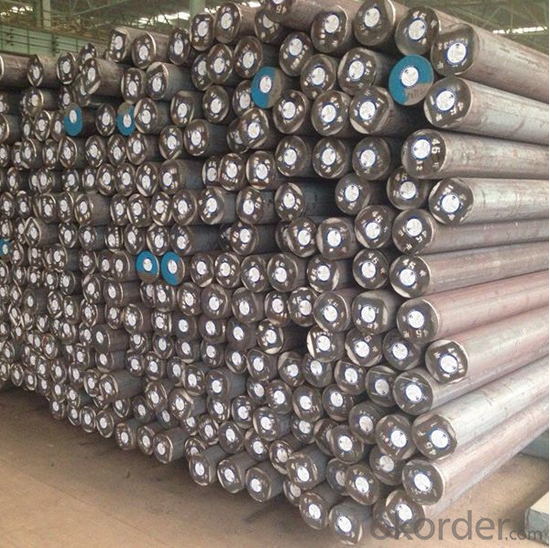
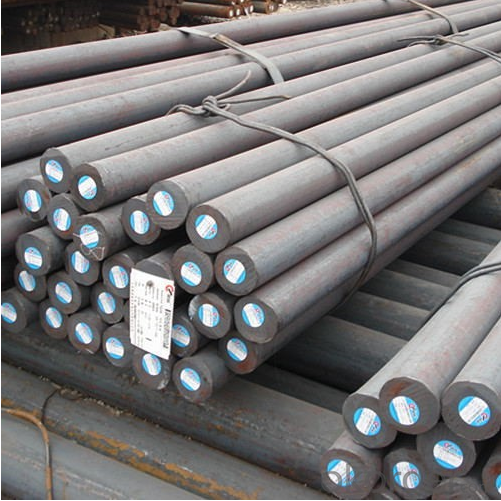
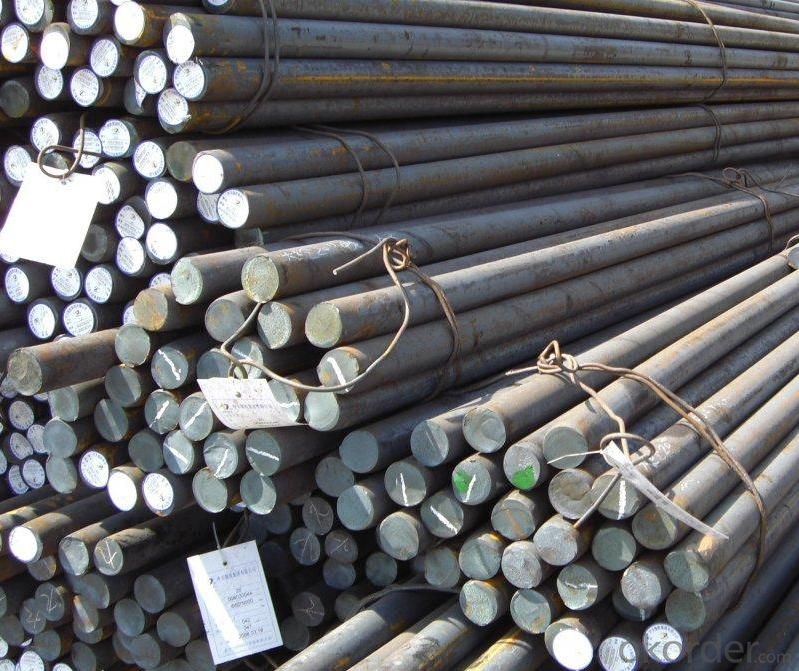
- Q: What are the different peening techniques used for special steel?
- There are several peening techniques used for special steel, including shot peening, ultrasonic peening, laser peening, and hammer peening. Shot peening involves bombarding the steel surface with small spherical particles to induce compressive stress and improve fatigue resistance. Ultrasonic peening uses high-frequency vibrations to create compressive stress and improve material properties. Laser peening involves using a high-energy laser to generate shockwaves and induce compressive stress. Hammer peening uses mechanical impact from a hammer or similar tool to create compressive stress on the steel surface. These techniques are utilized to enhance the durability, strength, and performance of special steel in various applications.
- Q: Can special steel be used in the energy sector?
- Indeed, the energy sector can utilize special steel. This term encompasses a range of high-performance alloys that are specifically crafted for applications necessitating exceptional strength, durability, and resistance to corrosion and extreme temperatures. These qualities render special steel an optimal choice for numerous components employed in the energy sector. Within the oil and gas industry, special steel is frequently employed in the construction of pipelines, drilling equipment, and offshore platforms. Its robustness and resistance to corrosion guarantee the integrity and reliability of these vital structures, even in challenging environments. Special steel is also extensively employed in power generation plants. For instance, in thermal power plants that generate steam for electricity production, special steel is employed in the production of boiler tubes and pressure vessels. The extraordinary heat resistance and structural integrity of special steel ensure the secure and efficient operation of these components, even under high temperatures and pressure. Moreover, special steel finds applications in the renewable energy sectors, such as wind and solar power. In the case of wind turbines, special steel is utilized in the manufacturing of rotor shafts, gears, and bearings, all of which undergo substantial mechanical loads. Similarly, in concentrated solar power plants, special steel is employed for the construction of heat exchangers, receivers, and storage systems. Overall, the presence of special steel in the energy sector plays a pivotal role in enhancing the performance, safety, and longevity of various components and structures. Its exceptional properties make it an indispensable material, supporting the infrastructure and operations of the energy industry.
- Q: What are the main elements in special steel alloys?
- The main elements in special steel alloys can vary depending on the specific type of alloy and its intended application. However, there are several common elements that are often present in special steel alloys. These include: 1. Iron (Fe): Iron is the main component of steel alloys, providing its base strength and durability. 2. Carbon (C): Carbon is a key element in steel alloys, as it significantly influences the hardness and strength of the material. Different levels of carbon content can result in varying properties, such as high carbon steel for increased hardness or low carbon steel for improved ductility. 3. Chromium (Cr): Chromium is commonly added to steel alloys to enhance their corrosion resistance. It forms a protective layer on the surface of the alloy, preventing oxidation and rusting. 4. Nickel (Ni): Nickel is often used in special steel alloys to improve their resistance to heat and corrosion. It also contributes to enhancing the material's strength and toughness. 5. Manganese (Mn): Manganese is commonly added to steel alloys to improve their workability and machinability. It also enhances the material's strength and impact resistance. 6. Molybdenum (Mo): Molybdenum is frequently included in special steel alloys to increase their strength, hardness, and high-temperature resistance. It also improves the alloy's ability to withstand corrosion. 7. Vanadium (V): Vanadium is often added to steel alloys to enhance their strength, toughness, and heat resistance. It also aids in refining the grain structure of the alloy, resulting in improved performance. These are just a few examples of the main elements commonly found in special steel alloys. Depending on the specific requirements and desired properties, other elements such as tungsten, cobalt, copper, and titanium may also be present in varying amounts. The combination of these elements in different proportions allows for the creation of specialized steel alloys with unique properties tailored for specific applications in industries such as aerospace, automotive, construction, and manufacturing.
- Q: What is the cost difference between regular steel and special steel?
- The cost difference between regular steel and special steel can vary depending on several factors. Special steel is typically more expensive than regular steel due to its enhanced properties and specific applications. Regular steel, also known as carbon steel, is widely available and relatively affordable. It is primarily composed of iron and carbon, with trace amounts of other elements. Regular steel is suitable for various general-purpose applications, such as construction, manufacturing, and automotive industries. On the other hand, special steel refers to a wide range of alloyed steels that are specifically engineered to possess certain desirable characteristics, such as increased strength, improved corrosion resistance, heat resistance, or enhanced machinability. These special properties make them ideal for specialized applications in industries like aerospace, defense, oil and gas, and automotive manufacturing. The cost difference between regular steel and special steel can be significant due to the additional processing steps and the use of expensive alloying elements. Special steels require precise control over the composition and manufacturing process to achieve the desired properties. This entails additional costs associated with alloying elements, heat treatment, and specialized equipment. Moreover, the demand and availability of special steel can also impact its cost. Since special steel is produced in smaller quantities and caters to specific industries, it may have a higher price tag compared to regular steel, which is produced in larger volumes. In conclusion, the cost difference between regular steel and special steel can vary based on the specific type of special steel, the desired properties, and the market demand. Special steel tends to be more expensive than regular steel due to its enhanced properties and specialized manufacturing processes required.
- Q: What are the main applications of special steel in the packaging machinery?
- Special steel is widely used in packaging machinery for various applications, including the production of durable and corrosion-resistant parts such as blades, cutting tools, and machine components. The high strength and hardness of special steel allow for efficient and precise cutting, shaping, and sealing processes, ensuring the quality and reliability of packaging operations. Additionally, special steel's resistance to wear and tear enhances the longevity of packaging machinery, reducing maintenance costs and downtime.
- Q: What are the properties of corrosion-resistant steel?
- Corrosion-resistant steel, also known as stainless steel, possesses several properties that make it highly resistant to corrosion. These properties include a high chromium content, which forms a protective oxide layer on the surface of the steel, preventing further corrosion. Additionally, it contains varying amounts of other elements such as nickel, molybdenum, and nitrogen, which further enhance its corrosion resistance. Stainless steel is also known for its durability, strength, and ability to withstand extreme temperatures and harsh environments. Overall, these properties make corrosion-resistant steel a reliable and long-lasting material for various applications in industries such as construction, automotive, and aerospace.
- Q: What are the specific requirements for special steel used in the food processing industry?
- The specific requirements for special steel used in the food processing industry include being resistant to corrosion, easy to clean and sanitize, non-reactive with food products, and compliant with food safety regulations. It should also have high strength and durability to withstand heavy usage and frequent cleaning.
- Q: How does special steel contribute to the construction of infrastructure projects?
- Special steel plays a crucial role in the construction of infrastructure projects by offering enhanced strength, durability, and versatility. This type of steel is specifically designed to meet the unique requirements and challenges posed by infrastructure projects, making it an essential component in their successful completion. One way in which special steel contributes to infrastructure projects is through its superior strength. Infrastructure projects, such as bridges, tunnels, and high-rise buildings, require materials that can withstand heavy loads and harsh environmental conditions. Special steel possesses high tensile and yield strength, allowing it to bear significant loads without deformation or failure. This strength ensures the structural integrity and safety of the infrastructure, offering peace of mind to engineers, architects, and the public. Durability is another crucial aspect that special steel brings to infrastructure projects. These projects are often subjected to various environmental factors, including extreme temperatures, moisture, and corrosive elements. Special steel is designed to resist corrosion, oxidation, and degradation, making it highly durable and capable of withstanding harsh conditions. Its long lifespan reduces maintenance and replacement costs, making it a cost-effective choice for infrastructure projects. Versatility is yet another advantage of special steel in infrastructure construction. It can be customized and fabricated into various shapes and sizes to fit the specific needs of different projects. Whether it is used for beams, columns, or reinforcements, special steel offers flexibility in design and construction. This adaptability enables engineers and architects to create innovative and efficient infrastructure designs, optimizing space and resources. Furthermore, special steel contributes to the sustainability of infrastructure projects. Its recyclability and eco-friendly nature make it an environmentally responsible choice. Steel can be recycled without compromising its properties, reducing the demand for new raw materials and minimizing waste. This sustainable approach aligns with the growing emphasis on environmentally friendly construction practices, making special steel an ideal material for infrastructure projects. In conclusion, special steel significantly contributes to the construction of infrastructure projects through its superior strength, durability, versatility, and sustainability. Its ability to withstand heavy loads, harsh environmental conditions, and provide long-lasting performance ensures the safety and reliability of infrastructure. Moreover, its flexibility in design and construction allows for innovative and efficient project execution. With these advantages, special steel remains an essential component in the development of robust and sustainable infrastructure.
- Q: Can special steel be used in the manufacturing industry?
- Yes, special steel can be commonly used in the manufacturing industry due to its unique properties and characteristics. Special steel alloys are often preferred for their high strength, durability, and resistance to corrosion, heat, and wear. These properties make special steel suitable for various applications in manufacturing, such as in the production of machinery, tools, automotive parts, aerospace components, and construction materials.
- Q: How does alloy steel improve the strength and toughness of steel?
- Alloy steel improves the strength and toughness of steel by introducing additional elements, such as chromium, nickel, or manganese, which alter the microstructure and properties of the material. These alloying elements form solid solutions, precipitates, or carbides, which strengthen the steel by hindering dislocation movement and grain growth. The resulting steel exhibits higher tensile strength, better resistance to wear, improved hardness, and increased toughness, making it suitable for various demanding applications.
Send your message to us
S45C Forged Steel Round Bar for Building Material
- Loading Port:
- Tianjin
- Payment Terms:
- TT OR LC
- Min Order Qty:
- 25 m.t.
- Supply Capability:
- 50000 m.t./month
OKorder Service Pledge
OKorder Financial Service
Similar products
Hot products
Hot Searches
Related keywords
